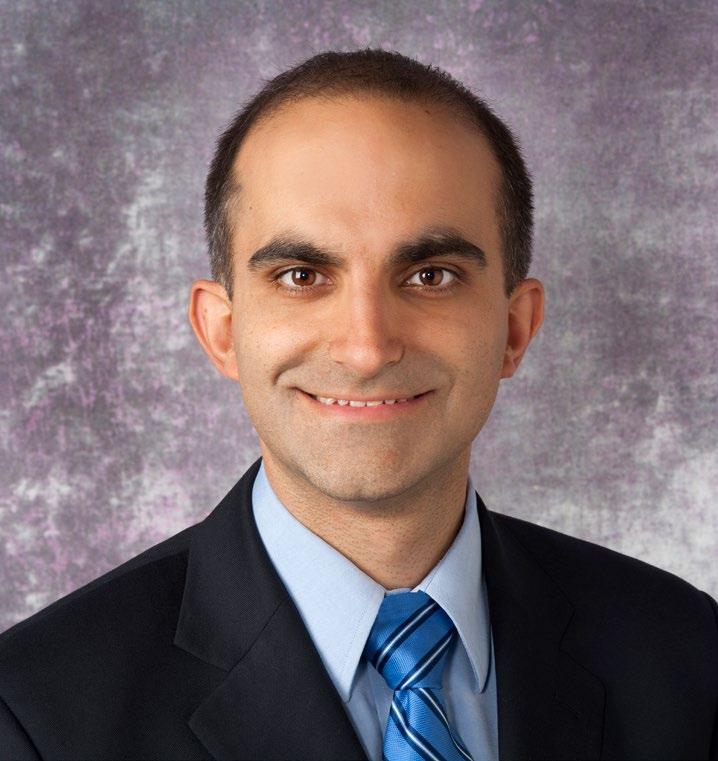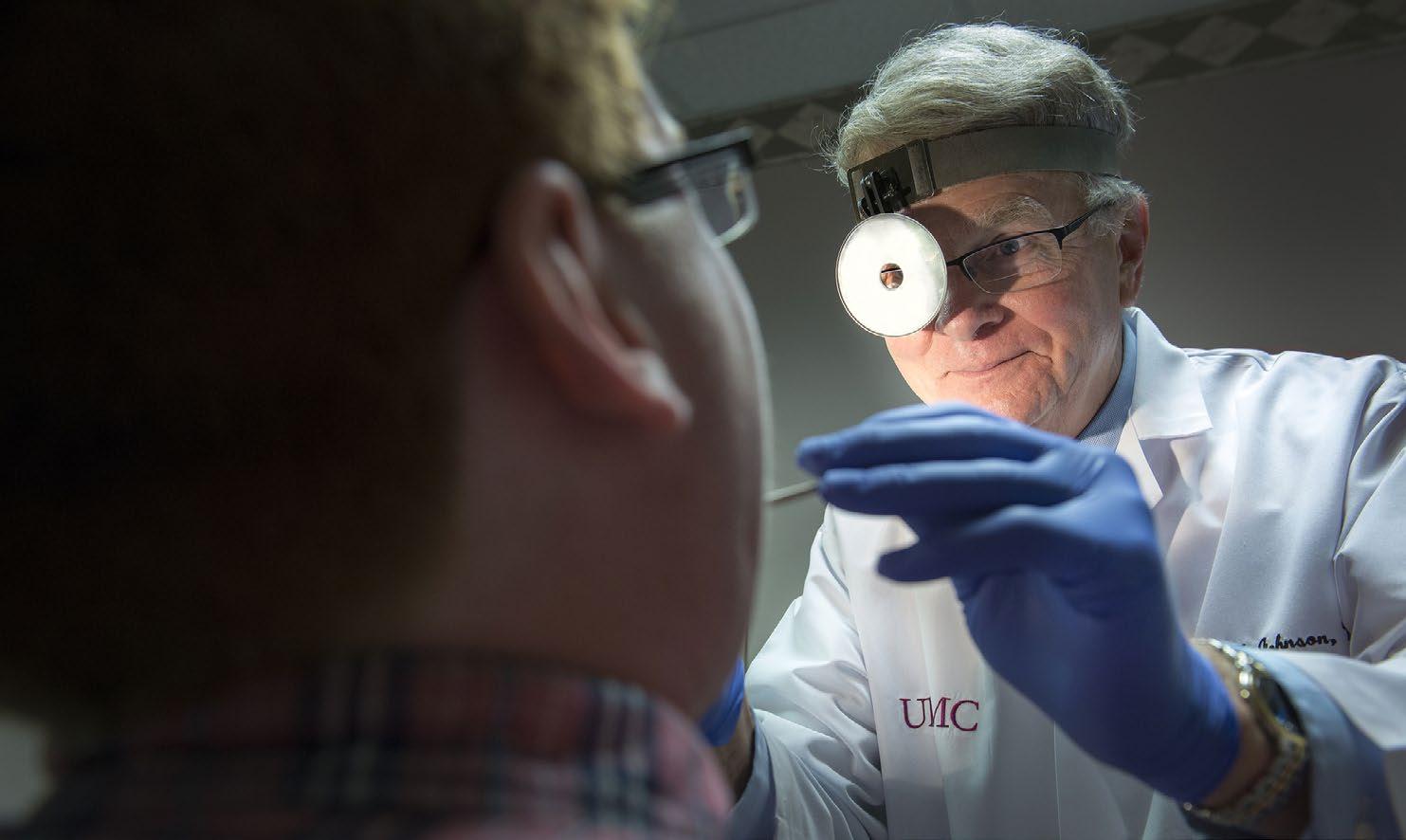
5 minute read
Global Health: Perspectives from South Africa
The Capstone Rotation Jonas Johnson to Step Down as Department of Otolaryngology Chairman
DWhen I completed my residency training, I ended my time on a busy Head & Neck and Microvascular rotation. I moved my family across the country and landed in my fellowship program running on fumes. We do not want this for our graduating chiefs. So, in considering our rotation schedule, we sought to develop a program that would allow them to finish strong.
The intention of the ACGME in having 6 months of Otolaryngology rotations in the first year of training, is to allow for flexibility in the final year of training. Largely, across the country, this has not occurred. But we have developed a method to create this flexibility in the final month of training that we call the Capstone rotation.
For the past 3 years, we have moved the start of the academic year for each class from July 1 to around June 1. This creates a problem of having too many chief residents around, since the PGY-4s are now serving as PGY-5s for that final month. So, the graduating chiefs are assigned to the Capstone rotation. They submit a proposal of how they would like to end their residency experience in order to round out their training. Examples of these experiences include: - away rotations to other programs for further training in pediatric sleep, oculoplastic surgery, facial plastic surgery - rotations in other UPMC departments for oculoplastic surgery, dermatology, and allergy/immunology - repeat mini-rotations in particular subspecialties within our department to develop further expertise, create surgical preferences for future practice, or augment areas of perceived weakness - completion of particular research projects - development of anatomic dissection curricula
Noel Jabbour, MD, MS, FACS Residency Program Director
We are excited that this Capstone rotation has provided an opportunity for our graduating chiefs to end their time in Pittsburgh in a way that allows for this flexibility and autonomy. And we aim to extend the course by 1 week each year, for the next few years. The Capstone rotation allows our chief residents to round out their experience, to finish strong, and to start fresh for the next stage of their careers, whether they are continuing their training in a fellowship program or starting their practices. Our graduates are our ambassadors.

Eye & Ear Foundation Announces Ambitious Campaign
The Eye & Ear Foundation has announced their New Horizons for Care Campaign. The Eye & Ear Foundation (EEF) is a public, non-profit organization that supports the Departments of Ophthalmology and Otolaryngology at the University of Pittsburgh School of Medicine. Its mission is to advance cuttingedge academic and research efforts with the ultimate goal of enhancing patient care. EEF launched the $80 Million Campaign in 2016 and has reached over its halfway point, $52 Million.
According to the Eye & Ear Foundation CEO Lawton Snyder, the New Horizons for Care Campaign responds to the community’s needs to address the increasing number of people affected by age-related conditions such as macular degeneration, glaucoma, and hearing loss. As the two academic research Departments are growing, “We saw an opportunity for Pittsburgh to be a world leader in finding new ways to advance care, first in our backyard, and ultimately the rest of the world. By raising and distributing philanthropic dollars to the Departments of Ophthalmology and Otolaryngology, the Foundation encourages individuals, foundations, and businesses to support enhancing and advancing care for people with diseases and disorders of the eye, ear, nose, throat, head, and neck,” says Snyder. The Foundation intends to complete its Campaign by the end of 2023. Department Chairman Jonas T. Johnson, MD, is focusing on AdvancemENTs in Patient Care. As described in a report from the President’s Council of Advisors on Science and Technology, nearly 50 % of people older than 60 have hearing loss. As more people live longer, these numbers are expected to grow, from 46 million in 2014 to 82 million in 2040. The Department of Otolaryngology is recognized for excellence in medical training, minimally invasive surgery, and hearing loss research. Dr. Johnson plans to build upon these strengths by creating new opportunities for excellence, developing new technologies and advancements in surgery, building our translational research capabilities, and personalizing care for every patient. Dear Colleagues,
Dr. Jonas Johnson has informed me that, after 42 years with the University of Pittsburgh School of Medicine, he is stepping down as chair of the Department of Otolaryngology, a position he has held since 2005. Dr. Johnson is the Distinguished Service Professor of Otolaryngology and the Dr. Eugene N. Myers Professor of Otolaryngology. Reflecting his longtime support of interdisciplinary collaboration, he also has numerous secondary appointments in the health sciences. I’m grateful to report that he will remain chair of the department until a new chair arrives on campus. He will then transition to being full-time Distinguished Service Professor of Otolaryngology and continue to codirect the UPMC Head and Neck Cancer Survivorship Clinic.
When Dr. Johnson became chair of otolaryngology, he followed in the footsteps of founding chair Dr. Eugene Myers, who developed the department into an internationally recognized leader in the field. Jonas may have stepped into big shoes, but he more than filled them. He is an expert in perioperative antibiotic prophylaxis during major head and neck surgery, imaging of head and neck tumors, the apoptosis of immune cells in head and neck cancer, the role of radiation in head and neck tumors, adjuvant treatment in head and neck cancer, and treatment of parotid disorders.
After spending several decades as a busy, practicing cancer surgeon, in 2016 Dr. Johnson transitioned to helping improve the postsurgical lives of patients. With his codirector, Dr. Marci Lee Nilsen, assistant professor of acute and tertiary care in the School of Nursing, he created the UPMC Head and Neck Cancer Survivorship Clinic to better understand and manage the toxic side effects that survivors of head and neck cancer can experience. Since it was established, the clinic has had more than 3,000 visits.
Dr. Johnson has served as editor-in-chief of The Laryngoscope and is a past president of the American Head and Neck Society, the American Academy of Otolaryngology—Head and Neck Society and the Triologic Society. He is a fellow in the American Academy of Otolaryngology—Head and Neck Surgery; American Head and Neck Society; the Laryngological, Rhinological, Otological Society Inc. (“Triologic Society”); and American Laryngological Society Inc.
I would like to thank Jonas for his years of leadership and service, as well as his tremendous contributions to our community and to the lives of so many people.
Respectfully,
Anantha Shekhar, MD, PhD
Senior Vice Chancellor for the Health Sciences John and Gertrude Petersen Dean, School of Medicine







